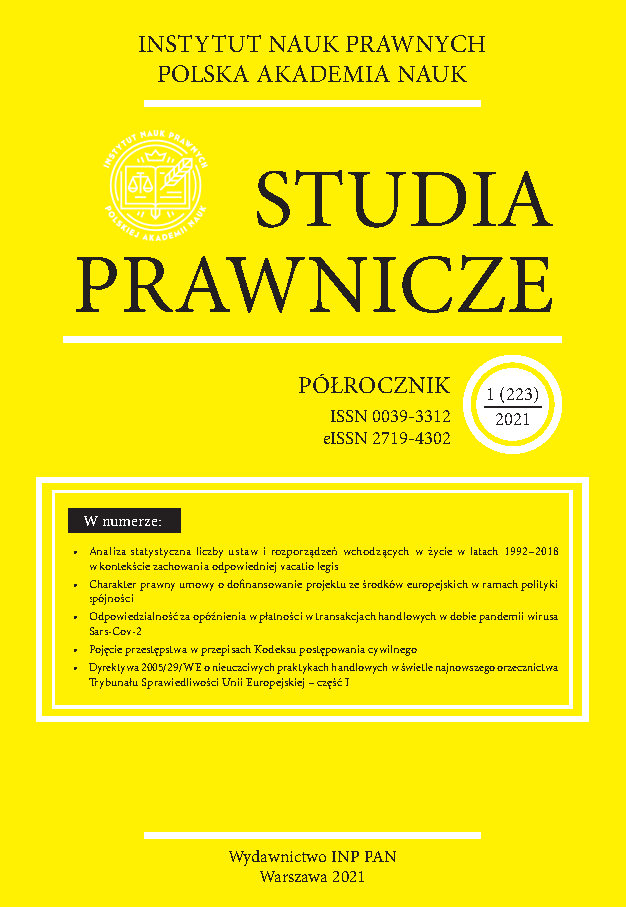Zmiana płci metrykalnej w przypadku transseksualistów w ujęciu praw człowieka
The procedure of legal gender reassignment for transgender people and the protection of right to private life in the Polish and foreign law
Author(s): Małgorzata SzeroczyńskaSubject(s): Law, Constitution, Jurisprudence
Published by: Instytut Nauk Prawnych PAN
Keywords: transsexuals; human rights; gender reassignment; gender; birth certificate; right to private life
Summary/Abstract: The following article presents the legal situation of transgender people and the rules of legal identification of their gender. From the legal point of view we should ask what is more important -biology or psychic - and what follows - if the diagnosis of transsexualism can justify the change of gender assignment and sex connected name in the birth certificate and other identity documents. If the answer is positive we should decide what preconditions and what a legal procedure for such a reassignment shell be. On the 12 September 1989 the European Parliament enacted the Resolution on discrimination of transsexuals. According to this resolution the life concordant to one’s gender identity is acknowledged as a personal right of every human being, issued from the innate dignity. The European Parliament appealed to States to adapt adequate national laws permitting to transsexuals both the medical and legal gender reassignment. The same attitude to the human rights of transsexuals is presented nowadays also by the Tribunal of Human Rights which in the case Van Ruck v. Germany from the 12 June 2003 explicitly declared that the gender identity and sexual orientation are included in the private life protected by the art. 8 of the European Convention on Human Rights. Also the matters of name changes and legal gender reassignment are enveloped by this protection. The Polish Supreme Court assumed that legal gender reassignment shell be done in the judicial process based on the art. 189 of code of civil procedure and the case is sued against the parents of the transsexual. In the light of the jurisdiction by the Strasburg Tribunal there is no doubt that the transsexual has a right to keep in secret the fact of gender reassignment-such is the aim of changes of gender and name in birth certificates and other identity documents, as well as in the insurance or identity numbers. There is no contraindication against the assumption that the right to secret includes the next of kin, so also the parents. The experience shows that the transgender people often isolate from their families, change their life conditions just in order to omit the necessity of confrontation with the parents and the risk of psychical rejection. Therefore is should be admitted that such a judicial procedure of legal gender reassignment accepted by Polish jurisdiction which obliges the transsexuals to sue their parents infringes the fundamental right to privacy of transgender people by forcing them to reveal their gender identity and the fact of gender reassignment to their parents. Among various countries there is no one main procedure of legal gender reassignment for transgender people. Some states have chosen the civil process, others the administrative way. However, there is no doubt that commonly their right to change gender and other personal data in birth certificate or identity documents has been acknowledged. Not everywhere the inability to procreate is a precondition to legal gender reassignment (there are even cases noted when a legal man gave birth to a child). Some countries allow even a change of name and gender in identity documents without chirurgical gender reassignment and without formal change of these data in birth certificate. At present the transgender people after the legal gender reassignment have also the right to stay marry with their previous relationships. Therefore, an important doubt appears if the gender nowadays still has any legal meaning. When fathers are able to be mothers and husbands are able to be wives, perhaps shell we resign from the legal gender assignment and speak only about “spouse”, “parent” and “human being” and no more about “man” and “woman”?
Journal: Studia Prawnicze
- Issue Year: 2009
- Issue No: 1-2
- Page Range: 237-282
- Page Count: 48
- Language: Polish

